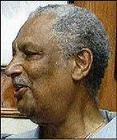Arthur Hall, Senior Staff Reporter

Golding
The Government is facing stinging backlash over its proposal to increase the time the police can hold persons in detention before charging them.
At present, persons have to be charged within 48 hours after they are detained but, on Tuesday, Prime Minister Bruce Golding told the House of Representatives that consideration is being given to a system of preventive detention, which would allow the police to hold persons for a longer time.
Yesterday, Golding sought to clarify his proposal, as he told the weekly post-Cabinet press briefing that the relationship between the powers of law enforcement agencies and the rights of Jamaicans were not at conflict.
Carefully balanced
According to the prime minister, this was part of the equation that had to be carefully balanced.
But, despite the clarification, alarm bells have been set off in the local human rights lobby community.
Already Jamaicans for Justice (JFJ) has urged the Golding administration not to follow through on the proposal.
Dr Carolyn Gomes, executive director of JFJ, said this was a measure that had been tried before without success.
"Why do we insist on doing the same thing over and over and expect a different result?" Gomes argued.
According to JFJ, in every instance in the past that Jamaicans have been called on to surrender civil liberties, their lot has worsened, not improved.
On Tuesday, Golding had sought to justify the measure, arguing it would give breathing space to communities under siege by criminals.
He argued there were communities that have erupted with violence, where intelligence points the security forces to those responsible but, while investigations are taking place, potential witnesses are killed.
"From a tactical point of view, what you need to do is take back control of that community to restore some order," Golding had argued.
He said a parliamentary team was to consider the proposal and submit its report by the end of this week.
Meeting with groups
During yesterday's post-Cabinet briefing, Golding said he wanted to meet with human rights groups in the island to discuss the "operational and transformational processes" that will take effect in law enforcement, in light of the proposal to introduce new strategies and legislation to deal with what he termed "abnormal criminal functions".
He also said he wanted to reassure the interest groups and the public that safeguards against abuse by the security forces would be introduced and carefully monitored.
The human rights lobby group said the strategy of asking citizens to surrender their civil liberties in the interest of fighting crime has been tried ad nauseam since the 1976 state of emergency, and has not resulted in a decrease in violent crime.
JFJ said, while it accepted crime was a major problem facing the country, it did not accept that allowing police more power to detain people would be the answer.
In the meantime, the Farquharson Institute said, while it was awaiting additional information on the proposal, its initial response was one of concern.
General secretary of the institute, Ken Jones, said he was worried that persons who were innocent could be affected under the new measure.
"I am not convinced that it is a solution. It is a band-aid," Jones said.
Nancy Anderson, of the Independent Jamaica Council of Human Rights, said the proposal should not see the light of day.
Totally against that
"I am totally against that. How would the police know who to detain? If they know, they should charge the persons and take them before the courts," Anderson declared.
She argued that allowing the police to detain persons for extended periods would give the police too much power, and experience should have taught Jamaica this was not in the best interest of the country.
"What we need is more cooperation between the people and the police, and that won't happen if the police start detaining persons and holding them for extended periods."
Anderson dismissed persons who claim that Jamaican gunmen are terrorists and should be treated similarly to how the British authorities detain terrorists without charge for 42 days.
"We have a Terrorism Act and, based on this, these criminals cannot be described as terrorists," Anderson said.
The Golding administration has been struggling to find measures to deal with the frightening crime wave since taking state power last September.
Last week Golding emerged from a meeting with an Opposition team and announced that strong measures would be implemented to tame the crime monster.
At that time, he warned that Jamaicans could be asked to give up some of their rights, but gave no details.
Almost 800 people have been killed across the island since the start of the year.

arthur.hall@gleanerjm.com


Left: Dr Carolyn Gomes, executive director of Jamaicans for Justice. Right: Jones

